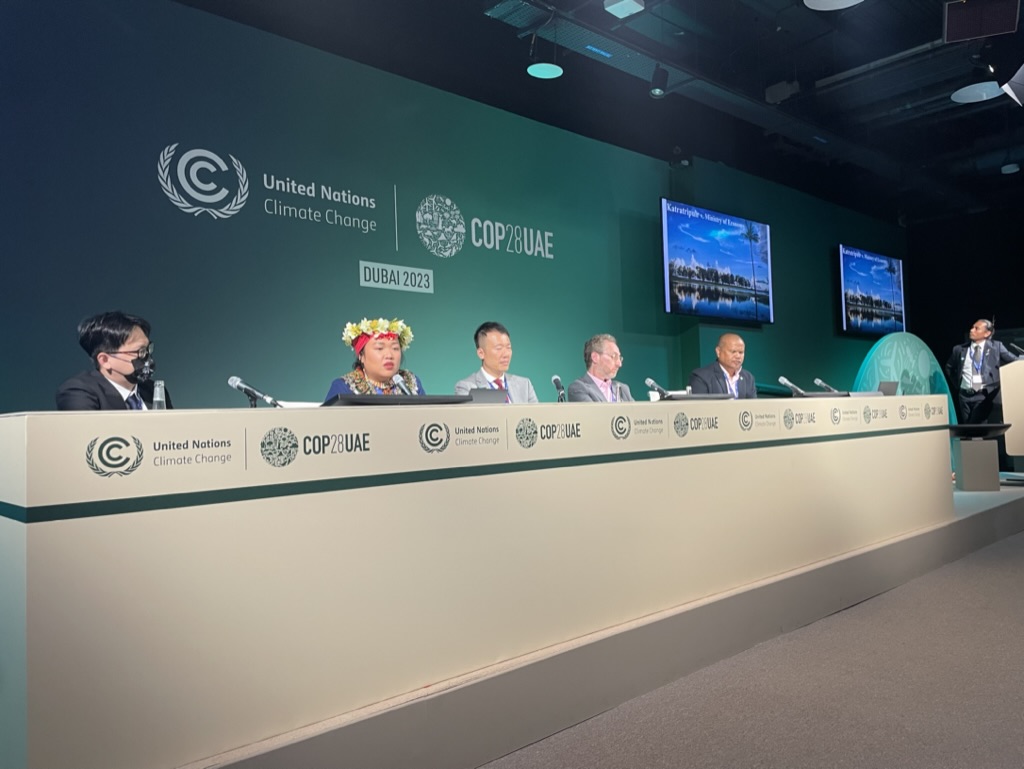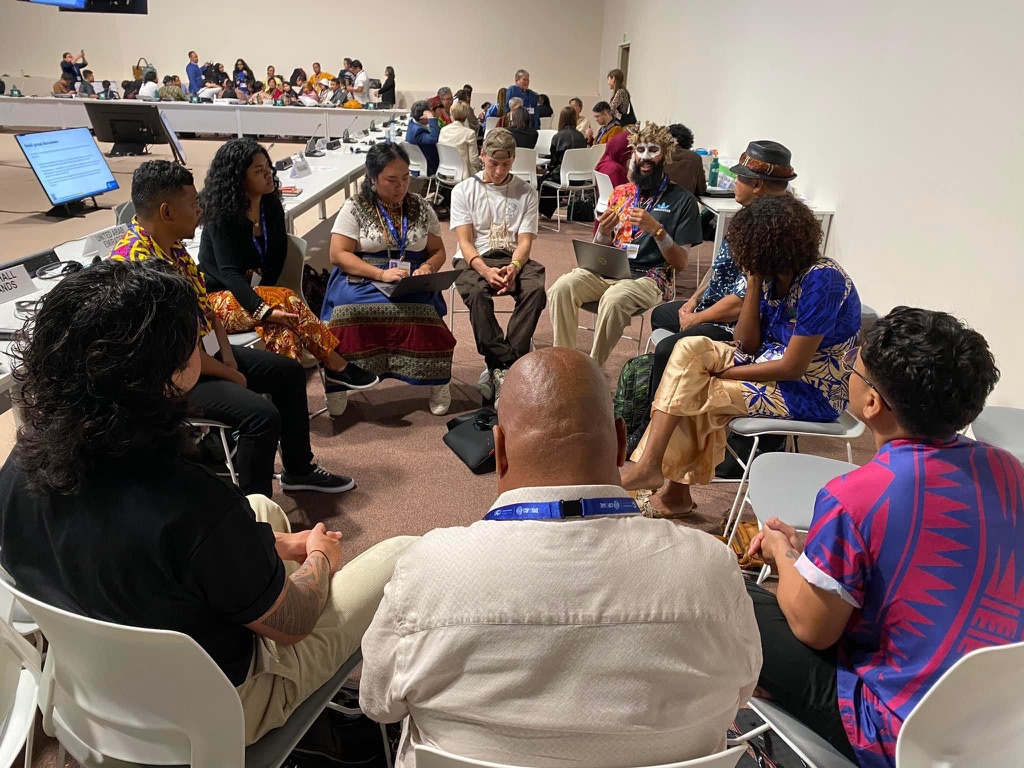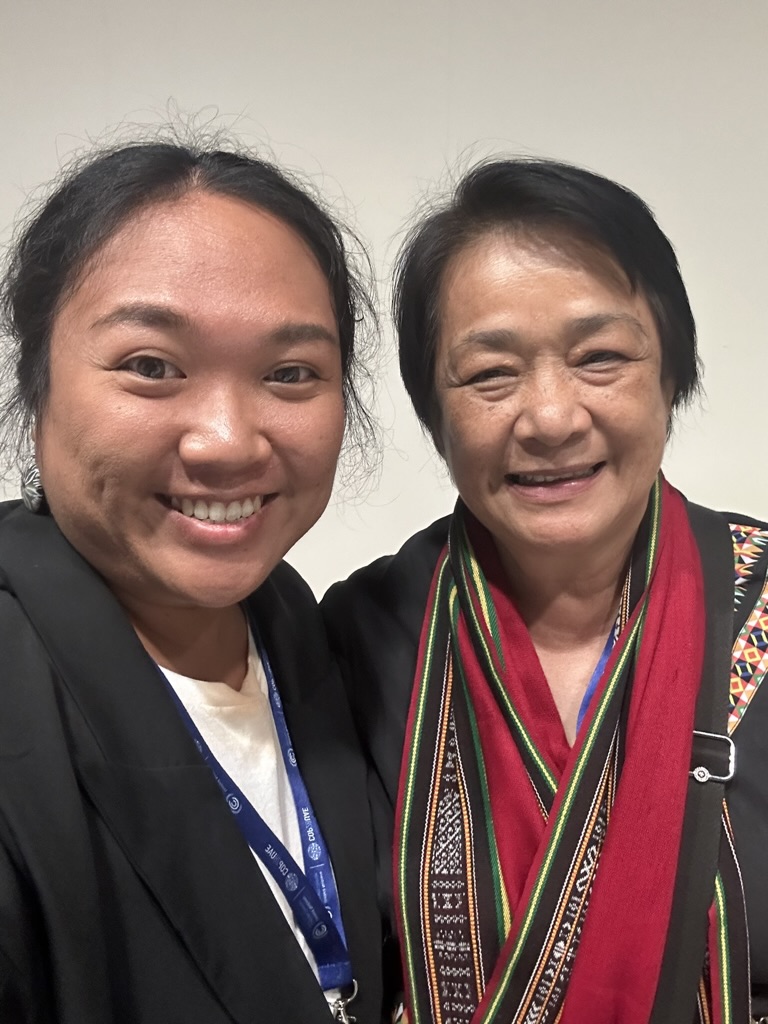
Eleng presenting on Indigenous Knowledge and the Self-determination of Taiwan Indigenous Peoples at COP28. From the left, I-Chan Cheng, Deputy Secretary-General of Environmental Quality Protection Foundation; Eleng Kazangiljan LLM candidate of William S. Richardson Law School, University of Hawaii; Ming-Hong Yen, Director of TaiwanICDF; Michael Schiffer, Assistant Administrator of United States Agency for International Development; Steven Victor, Minister of Ministry of Agriculture, Fisheries and Environment of the Republic of Palau; Xavier E. Matsutaro, Head, Office of Climate Change and National Climate Change Coordinator of the Republic of Palau.
As an Indigenous person from the Paiwan people in Taiwan, my focus on COP28 was the intersection of Indigenous peoples’ rights and climate change. The common challenges Indigenous peoples face are just transitions, adaptation to extreme natural disasters, and loss and damages of funds. When we talk about just transition, free, prior, and informed consent (FPIC) is the fundamental rule to safeguard Indigenous peoples’ right to self-determination.
Many Indigenous peoples raised their concerns and protested renewable energy taking place on their traditional land without FPIC. In the LCIPP Annual Youth Round Table meeting, a group of Sámi youth from Norway stressed that clean energy solutions should not encroach on the sacred land of Indigenous peoples. This group was referring to the construction of a controversial wind farm on Sámi land. The wind farm contains 151 turbines and constitutes Europe’s largest onshore wind farm located in the Fosen district. Norway’s Supreme Court ruled in October 2021 that the construction of the wind turbines had violated the rights of the Sámi people, who have used the land for reindeer for centuries. However, the wind farm is still operating regardless of the ruling. Other cases like hydropower dams that endangered Indigenous peoples’ way of life can be seen in Asia, North America, etc.

During COP28, I was invited to talk story at a side event hosted by the Republic of Palau and the Taiwan International Cooperation and Development Fund (TaiwanICDF). On the topic of Indigenous Knowledge and Self-determination of Taiwan Indigenous Peoples in the Pursuit of Environmental Justice, I shared the story of a solar power plant development at the Katratripulr community of the Indigenous Pinuyumayan people of Taiwan. The Pinuyumayan people used their right to free, prior, and informed consent to win the case. I also presented on how the traditional knowledge and decision-making of the Paiwan people came into play during the typhoon Morakot (which is equivalent to a Category 2 hurricane) reconstruction.
In the LCIPP Annual Youth Round Table Discussion, on the topic of enabling energy transition strategies that intertwine environmental, social, eco, and cultural benefits, the Indigenous knowledge holder, Anne Lasimbang from Borneo Island, Malaysia shared the example of a community-based micro hydropower plant in Ulu Papar. This project is led by the local community and supported by the EU to develop small-scale hydropower which relies on Indigenous knowledge for site-choosing. The project not only decreases the impact on the ecosystem but also protects the watershed.

Echoing what the traditional knowledge holders said in the conference, “the relationship between Indigenous peoples and water, forests, animals, and other natural resources is spiritual and reciprocal. Holistic thinking of Indigenous people should be respected.” All and all, local and indigenous knowledge plays a significant role when facing climate change. The Indigenous peoples are more than just victims of climate change. We are the key to mediating climate change.
With the knowledge I learned from law school, I was able to see the bigger picture of international environmental law in practice, which was an eye-opening experience. Through the journey, I feel empowered by Indigenous siblings from around the globe, including youth, women, and elders. It is comforting to know that Indigenous peoples have been fighting for our rights from all aspects. Even though Taiwan is not recognized as a member of the UN yet, we can still find allies beyond the national borders and the political difficulties by building people-to-people relationships and trust. After all, climate change and environmental preservation are global issues that affect everyone, regardless of their location or nationality. These problems don’t respect national borders and require collective effort and cooperation to address.
Eleng Kazangiljan / Wun-Syuan Guo, LLM
SM 4/2/2024
